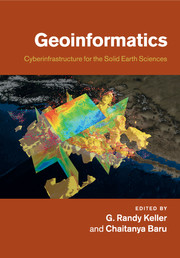Book contents
- Frontmatter
- Contents
- List of contributors
- Preface
- Introduction
- Part I Case studies from other disciplines
- Part II Modeling software and community codes
- Part III Visualization and data representation
- Part IV Knowledge management and data integration
- Part V Web services and scientific workflows
- Part VI Emerging international and other efforts
- 18 It's not your data, it's everyone's: The benefits of a corporate approach to scientific information
- 19 TOPO-EUROPE and cyberinfrastructure: Quantifying coupled deep earth – surface processes in 4-D
- 20 OneGeology – from concept to global project
- 21 Geoinformatics developments in Germany
- 22 iGEON: Networking the Indian geosciences community through GEON
- 23 Geoinformatics in the public service: Building a cyberinfrastructure across the geological surveys
- 24 Application of the US Geoscience Information Network to deploying a national geothermal data system
- Index
- Plate section
18 - It's not your data, it's everyone's: The benefits of a corporate approach to scientific information
from Part VI - Emerging international and other efforts
Published online by Cambridge University Press: 25 October 2011
- Frontmatter
- Contents
- List of contributors
- Preface
- Introduction
- Part I Case studies from other disciplines
- Part II Modeling software and community codes
- Part III Visualization and data representation
- Part IV Knowledge management and data integration
- Part V Web services and scientific workflows
- Part VI Emerging international and other efforts
- 18 It's not your data, it's everyone's: The benefits of a corporate approach to scientific information
- 19 TOPO-EUROPE and cyberinfrastructure: Quantifying coupled deep earth – surface processes in 4-D
- 20 OneGeology – from concept to global project
- 21 Geoinformatics developments in Germany
- 22 iGEON: Networking the Indian geosciences community through GEON
- 23 Geoinformatics in the public service: Building a cyberinfrastructure across the geological surveys
- 24 Application of the US Geoscience Information Network to deploying a national geothermal data system
- Index
- Plate section
Summary
Background
The British Geological Survey (BGS) is the national geological survey of the United Kingdom with national responsibility for the acquisition, analysis, management, and delivery of geoscience data, information, and knowledge. BGS employs approximately 750 people and its budget is ~£60 million, only 50% of which is funded directly by government.
In 1992, a UK Treasury agency study of BGS and its data and information management and concluded that:
The fragmentation of data, and the questions about its accuracy, mean that BGS information systems cannot support BGS's claims to be the National Archive for Geological Data or a National Geoscience Information System. They also call into doubt the value of the unique data holdings as a major competitive strength.
Perhaps reflecting the internal view of the relative importance of data prevailing in BGS at that time, this indictment did not result in immediate remedial action. Data storage in non-interoperable information silos and fragmented management of the data (and arguably the organization) continued. However, the criticism was to be repeated in a further external review in 1996 and, following that, action was taken. In 2000, after 2+ years of pilot studies and developing a new strategy, BGS restructured radically. It moved from a hierarchically managed organization to a matrix managed one and also created a dedicated Information Directorate. This new Directorate was assigned approximately one third of the BGS budget and corporate priority was given to work on data and information.
- Type
- Chapter
- Information
- GeoinformaticsCyberinfrastructure for the Solid Earth Sciences, pp. 287 - 291Publisher: Cambridge University PressPrint publication year: 2011

